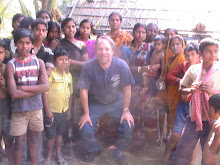Ignorance is not Bliss
Perhaps because I maintain close track of events in South Asia, I am constantly amazed at how little most Americans know about events there. Moreover, it is clear that India will likely to become one of the US's most important allies--if we proceed appropriately--and that South Asia is the really critical battleground between freedom and Islamist totalitarianism.
To be sure, we in the West are blissfully ignorant of perhaps the largest case of ethnic cleansing in modern times: the elimination of Hindus in Bangladesh, who even after being driven from almost a third of the population to under eight percent, still number around 15 million souls--15 million souls at risk and facing brutalization every day. This quiet case of ethnic cleansing, as I have dubbed it, is now spilling into India, particularly in West Bengal and the Northeast where radicals and appeasers now seem to hold sway.
A small number of Americans know a little about mass murders in Bangladesh during its 1971 revolution by Pakistani troops and local collaborators--around two to three million; and a smaller number will avidly point to the current Bangladeshi government's prosecution of those decades old crimes. That might be true--and it comports with the ruling party's ideology--but almost none of my fellow Americans know that those prosecutions cover only the highest profile offenses, and specifically ignore some of the most egregious examples of anti-Hindu activity. According to Rabindra Ghosh of Bangladesh Minority Watch and a tireless foe of government-enabled ethnic cleansing in his country, 22 Hindus were killed for their faith at Motbaria Upazilla of the Perojpur District of Bangladesh in 1971; and due in part to pressure by a Member of Parliament, not a single charge has ever been filed in the case. Several newspapers have highlighted the murders and lack of prosecution, but no Bangladeshi government has ever taken action. As a result of his activism, Advocate Ghosh and his family have been attacked by radicals with impunity.
In December, Indians were horrified at the gang rape-torture of a 23-year-old student on a public bus in Delhi. The nation was agonizing over the incident as the young woman clung to her life. When she lost that battle some days later, the reaction from Indians regardless of party or ideology was one of shock and anger. They demanded that the perpetrators be brought to justice and that the country seriously examine why India has been ranked as "the worst nation to be female" among the G20 countries. The intense pain and serious re-consideration has the potential to re-set gender roles in an area of the world where such change lags seriously behind much of the globe. But it remains to be seen if those who claim the mantle of women's rights have even taken notice, let alone offer help in what could be a real watershed in gender equality.
Is it political alliances, ignorance, or a bias that considers victims worthy only if they have been defined so? No matter, as far as most westerners are concerned, the brutalization of Hindus can proceed apace--even while strengthening our most inveterate enemies, as can the brutalization of women.
Labels: A Quiet Case of Ethnic Cleaning, anti-Hindu, Bangladesh, Bangladeshi Hindus, BDMW, ethnic cleansing, India, Rabindra Ghosh, Richard Benkin

